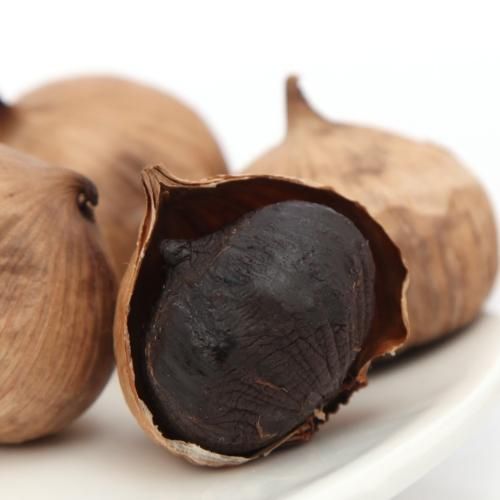The process for creating black garlic requires fermenting whole
bulbs of garlic at high temperatures for extended periods of time.
Black garlic is produced by fermenting through the aging of whole
bulbs of fresh garlic in a humidity-controlled environment (high
humidity (*0% RH)) in temperatures of about **0 to **0 degrees F
for *0 to *0 days. Even though aged black garlic is
considered fermented, it does not in fact involve microbial action,
as no fungus or yeast is involved in the aging process. The result
is a obsidian clove thats significantly sweeter and with a mellow
and meltingly savory garlic flavor. The texture is squishy and
soft, often similar to a gummy candy. The flavor is tangy and
sweet.
What is SAC?
During the aging process, unstable compounds of fresh garlic
including alliin are converted into stable compounds including the
water-soluble compound s-allyl cysteine (SAC). Since
s-allyl-cysteine is water soluble, it is absorbed more quickly and
easily by the body. S-allyl-cysteine also assists in
absorption of the fat soluble allicin. This compound is more
stable than allicin.
Function
Antioxidant Activity
The protective activities of SAC have been well studied and have
been shown to be associated with the prevention or amelioration of
oxidative stress, including the prevention of oxidation of lipids
and proteins. While the mechanism of most antioxidant compounds is
the quenching of specific free radicals (direct antioxidant
effect), the antioxidant properties of black garlic and SACs
include a direct antioxidant effect on all biologically-relevant
free radicals as well as numerous indirect antioxidant mechanisms,
making it truly a Complete Antioxidant. In fact, aged black garlic
showed stronger antioxidant activity in vitro and in vivo than raw
garlic due to the safe, stable, bioavailable and beneficial
compounds during the natural aging process.
Inhibition of Pro-oxidant Enzymes
SAC has also been shown to inhibit a number of pro-oxidant enzymes,
as an imbalance of these enzymes can increase oxidative stress.
Nitric oxide synthase (NOS) is a family of pro-oxidant enzymes that
catalyze the conversion of L-arginine to L-citrulline to produce
nitric oxide (NO). While nitric oxide is an important signaling
molecule for a number of physiological responses, increased levels
of NO are also associated with oxidative stress and disease by
causing damage to proteins, lipids and DNA either directly or after
reaction with superoxide. Black garlic and SAC have been shown to
help
regulate NOS enzymes, which can help prevent oxidative stress
resulting from imbalanced NO levels.4 ,SAC and black garlic have
also been shown to inhibit other pro-oxidant enzymes, whose
over-activation is related to different patho-physiological events,
including xanthine oxidase, NADPH oxidase and COX*2.
Cardiovascular Health
LDL cholesterol isolated from subjects receiving 2.4 g of black
garlic daily for 7 days were reported to be more resistant to
oxidation than LDL isolated from subjects receiving no
supplementation. In a double-blind, parallel randomized
placebo-controlled trial involving *0 patients, daily
supplementation with **0 mg black garlic (providing 2.4 mg SAC)
daily for *2 weeks resulted in reduced systolic blood pressure
compared with controls. A **-week, double-blind, randomized
placebo-controlled doseresponse trial reported a reduction of mean
systolic blood pressure in subjects supplemented with **0 or **0 mg
black garlic (containing 1.2/2.4mg of SAC) compared to placebo. In
a randomized, placebo-controlled, cross-over design, 2.4 grams/day
of black garlic supplementation improved endothelial function.
Brachial artery flow mediated endothelium-dependent dilation (FMD)
was shown to increase from the baseline. FMD is the most widely
used, non-invasive test for assessing endothelial function. Normal
functions of endothelial cells include mediation of coagulation,
platelet adhesion and immune function, while endothelial
dysfunction is associated with a number of cardiovascular
conditions. These data suggest that shortterm treatment with black
garlic may improve impaired endothelial function.
Summarize
Provides antioxidant support better than raw garlic;
Helps maintain healthy cholesterol levels and blood pressure
already in normal rang;
Supports improved immune function by increasing NK cell activity
and immunostimulatory activities.
